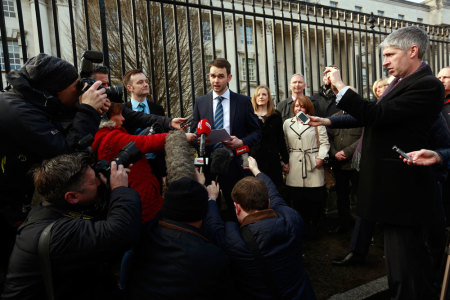3 Gay Marriage Supporters Who Still Support Religious Freedom

Debates over Indiana's new religious freedom law illustrate that gay marriage supporters now generally don't support certain basic religious freedom protections. There are some exceptions, however.
Here are three gay marriage-supporting law professors who still support religious freedom:
Daniel O. Conkle
Conkle, a professor at Indiana University Maurer School of Law, wrote a March 26 op-ed for IndyStar.com arguing that the state's Religious Freedom Restoration Act "has little to do with same-sex marriage and everything to do with religious freedom."
Most of the media reports about RFRA have been misleading, Conkle points out. Rather than promote discrimination against gays, as opponents have claimed, the law sets up a balancing test to direct courts on how to balance religious freedom against other competing rights.
"The proposed Indiana RFRA would provide valuable guidance to Indiana courts, directing them to balance religious freedom against competing interests under the same legal standard that applies throughout most of the land. It is anything but a 'license to discriminate,' and it should not be mischaracterized or dismissed on that basis," he wrote.
Andrew Koppleman
Koppleman, John Paul Stevens Professor of Law at Northwestern University, argued that accommodations should be made for wedding vendors who oppose gay marriage, in a forthcoming article for Southern California Law Review.
"I've been a gay rights advocate for more than 25 years. Here, for the first time, I make common cause with my longtime adversaries. I've worked very hard to create a regime in which it's safe to be gay. I'd also like that regime to be one that's safe for religious dissenters," he wrote.
A respect for religious differences has enabled the United States to become, possibly, the most religiously diverse nation ever, Koppleman continued.
"I think that [traditional marriage supporters'] religious ideas are obviously wrong. But that is what I think about an enormous range of beliefs, religious and other. Most Americans surely agree that some religious beliefs are worthless, harmful, weird delusions. They do not agree about which ones. This is nothing new. It is the chronic condition of the United States, probably the most religiously diverse nation in the history of the world. The way the American regime has coped with this diversity is to treat religion — understood at such an abstract level as to ignore all doctrinal differences — as a good, and to accommodate it where this is possible."
While Koppleman disagrees with religious groups who oppose same-sex marriage or believe homosexuality is a sin, he does not believe those groups "need to be punished or driven out of the marketplace."
Religious accommodation, he continued, is what has allowed a diversity of religious viewpoints to coexist in the United States and is as old as the Bill of Rights itself.
"Both gay people and religious conservatives seek space in society wherein they can live out their beliefs, values, and identities. As with the old religious differences that begot the Establishment Clause of the First Amendment, each side's most basic commitments entail that the other is in error about moral fundamentals, that the other's entire way of life is predicated on that error and ought not to exist. Coexistence has nonetheless been achieved in the religious sphere. ... Religious accommodation is a part of the reason for the regime's success," he wrote.
Douglas Laycock
Laycock, Robert E. Scott Distinguished Professor of Law at University of Virginia School of Law, was part of the coalition that wrote the original federal RFRA passed by Congress in 1993. In a Tuesday interview with Vox, Laycock pointed out that RFRA does not sanction discrimination against gays, as opponents claim, but does provide some important religious freedom protections.
No one has ever successfully used RFRA to give themselves a right to discriminate, he pointed out. Plus, the language differences between Indiana's RFRA and the federal RFRA was only to clarify the original intent of the federal RFRA. Indiana's law is not substantively different from the federal RFRA.
The lack of a state-level RFRA has, however, contributed to one person's death. Kansas does not have a RFRA. Because of that, Mary Stinemetz, a Jehovah's Witness, was not provided a religious accommodation when she needed a bloodless liver transplant that could have saved her life. The Kansas court of appeals eventually ruled that the Kansas constitution requires the RFRA standard, but the ruling came too late to save Stinemetz's life.
Gay marriage supporters are opposing RFRA, Laycock believes, because the more victories they score, they less willing they are to support religious freedom for dissenters.
"I think the lawyers for the gay rights movement know exactly what they're doing. This works, right? They killed a bill in Arizona, and it worked so well that they're doing it again. As the movement succeeds, as marriage equality nationwide seems within their reach, they also become more extreme in their demands, and more resistant to any kind of exemption for anybody. They just don't want to take any chance, they don't want to ever have to prove a compelling interest or worry that some red-state judge somewhere might decide differently from how every other judge everywhere in the country has decided," he said.





















